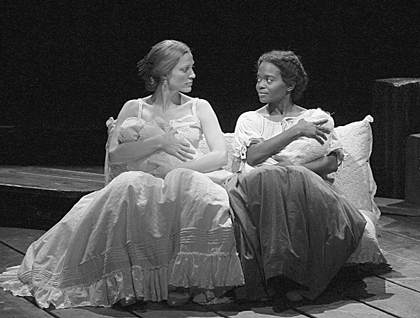An antebellum musical, behind the scenes at “Gone With the Wind” and comic book mayhem
With “Dessa Rose,” Lynn Ahrens and Stephen Flaherty have set for themselves a monumental task—creating an intimate, folk musical about abused slave women in 1847. With some exceptions, they largely succeed.
Ahrens’ book synthesizes a novel by Sherley Anne Williams about a young female slave who led a rebellion and a rich white woman who helped slaves escape to freedom. The plot uses a device in which the two women, the black Dessa Rose and the white Miss Ruth, are portrayed as young women and as old women looking back to tell the tale. It’s not an especially novel conceit, but it works here.
The score with music by Flaherty is often quite remarkable. There is a maturity in some of the songs, but there are also some less impressive––an introspective quasi-aria and a throwaway comic song. Flaherty’s songs for the slaves capture the period, and the use of found objects to punctuate the rhythms is stirring and richly emotive. There are a few soaring songs and rich harmonies that are historically accurate for the period as well, and once the story becomes more engaging in the second act, the show takes on a certain vibrancy.
The plot centers on the two women. Miss Ruth, a Charleston belle, marries for love and finds herself stuck with a gambler who abandons her. To keep her apparently crumbling, up-country plantation going, she harbors runaway slaves. That is how Dessa Rose is brought to her, pregnant, having just escaped being hung for starting the rebellion and fleeing the white Nehemiah who has fallen in love with her. Miss Ruth, who herself has just had a baby, is the only one who can nurse Dessa Rose’s child. And so begins a contentious but oddly loving relationship between the two.
Ultimately, Miss Ruth, Dessa and the other slaves cook up a scheme that will give them financial freedom by using slavery against the enslavers. Nehemiah proves a monomaniacal crackpot, and everyone dances off.
For her staging, Graciela Daniele draws on tableaux that would have characterized the melodrama of popular theater in 1847. Rachel York is in fine voice as Miss Ruth and she finds real humanity even in the stereotypical elements of the character. LaChanze as Dessa Rose is wonderful, balancing the anger, despair, mistrustfulness and hope of the character. She is testy and brittle, but when Dessa Rose warms up, the stage brightens. As Nehemiah, Michael Hayden is very good, and Kecia Lewis is sensational in multiple parts but especially as Miss Ruth’s Mammy.
Ron Hutchinson’s “Moonlight and Magnolias” is a screwball comedy right out of the playbook of Kaufman and Hart. If you like such chestnuts as “The Man Who Came to Dinner” or “George Washington Slept Here,” you will delight in this romp about writing the screenplay for “Gone with the Wind” (GWTW to its fans).
Personally, I like those plays and so was delightfully entertained by Hutchinson’s play. David O. Selznick is at his wits’ end and has stopped production on GWTW. He calls in writer Ben Hecht and director Victor Fleming and locks himself away with them in the office for five days, nourished by only bananas and peanuts—delivered by Selznick’s long-suffering secretary Miss Poopenghul. Formulaic hilarity ensues. The screenplay gets done and the curtain drops on Selznick trying to save “Intermezzo.”
Lynne Meadow has directed with a sure hand and a nice appreciation for vintage comedy—slow burns, double takes, pratfalls and female impersonation. The basic premise is that Hecht hasn’t read the book and Selznick and Fleming act it out for him, which leads, as one might imagine, to all kinds of goofiness as Prissy, Rhett, Scarlet, Miss Melanie and the rest come to life before us.
It’s wonderful to see Douglas Sills, as Selznick, back doing comedy. Sills is a fearless physical comedian with exceptional timing and gives us a wonderful glimpse of the frantic, oppressed and obsessed Selznick under that giant’s sleek exterior. David Rasche is equally silly as Fleming and Matthew Arkin as Hecht is like a dose of ice water dumped on the grandiosity of the other two in a marvelously dry performance. Margo Skinner is dead on in the beleaguered assistant role that is de rigueur for one of these plays.
Fun and fluffy, this well-constructed comedy only wants to entertain. Not a huge promise to be sure, but wonderfully delivered.
Time shifting, science fiction and comic books collide in the alternate universes conjured by playwright Roberto Aguire-Sacassa in “Golden Age.” Following the sometimes-alarming redhead Buddy Baxter, the fractured narrative is rich and engaging as Buddy and his comic book pals try to confront real life. In the wonderfully akimbo storytelling, child-killers Leopold and Loeb are juxtaposed against cultural moral posturing, coming out and trying to make it as grown-ups. The play is fresh, original, engaging and often heartfelt, and Aguire-Sacassa and director Claire Lundberg find the real people beneath the comic book clichés.
The highly engaging storytelling is enlivened by a wonderful cast that includes, notably, Christopher J. Hanke as Buddy Baxter, Tami Mansfield as Monica Posh, Sarah Elliott as Rosemary Hope, as well as Patch Darragh, Michael Chernus, Christopher Kromer and Charles F. Wagner IV.
Unusual, engaging, witty and poignant, the show made me want to go pull out all my old comic books for the sheer fun of the storytelling—and their newfound potential for subtext.
gaycitynews.com

































